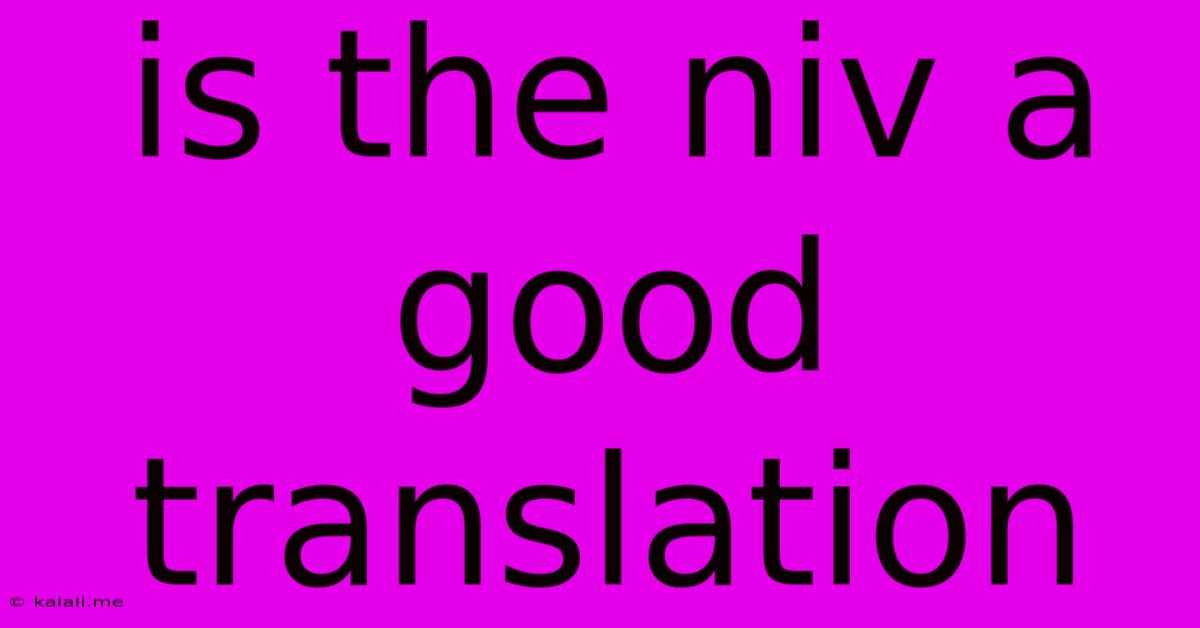Is The Niv A Good Translation
Kalali
Jun 05, 2025 · 3 min read

Table of Contents
Is the NIV a Good Translation? A Critical Look at the New International Version
The New International Version (NIV) is one of the most widely read English Bible translations, enjoying popularity among both churchgoers and casual readers. But is it a good translation? That's a question with nuanced answers, depending on your priorities and understanding of biblical translation philosophy. This article will delve into the NIV's strengths and weaknesses, helping you determine if it's the right choice for you.
This article will examine the NIV's translation philosophy, its accuracy, readability, and suitability for different purposes, ultimately providing a balanced assessment of its strengths and limitations as a modern English Bible translation.
The NIV's Translation Philosophy: A Balancing Act
The NIV aims for a balance between accuracy and readability. Unlike more literal translations like the King James Version (KJV) or the English Standard Version (ESV), the NIV prioritizes conveying the meaning of the original Hebrew, Aramaic, and Greek texts in clear, contemporary English. This approach often involves using dynamic equivalence, which focuses on communicating the meaning rather than directly mirroring the word-for-word structure of the original languages. This makes it more accessible to modern readers, but it also means some nuances and subtleties might be lost in translation. Conversely, formal equivalence translations like the ESV prioritize a more literal, word-for-word approach, potentially sacrificing readability for a closer adherence to the source text.
Accuracy and Reliability: Getting to the Source
The accuracy of any Bible translation is a complex issue. The NIV's translators have worked diligently to consult a wide range of scholarly resources and to employ rigorous methodology. However, inherent challenges in translating ancient texts into modern languages remain. Different interpretations of the original languages inevitably lead to variations in translation choices. While the NIV strives for accuracy, it’s important to remember that no translation is perfect; each represents a human interpretation of ancient texts. Consulting multiple translations can help overcome potential biases present in any single version, including the NIV. This is particularly crucial for passages with significant theological implications.
Readability and Accessibility: Engaging Modern Readers
One of the NIV's greatest strengths is its readability. Its contemporary language makes it significantly more accessible to a wider audience than older translations. This is a crucial factor for engaging modern readers, especially those unfamiliar with archaic language or complex sentence structures. The clarity of the NIV allows for easier comprehension and study, facilitating personal Bible study and group discussions. The simplicity of the language does not, however, compromise its theological depth.
Suitability for Different Purposes: A Multifaceted Tool
The NIV's versatility makes it suitable for various purposes. Its readability makes it ideal for personal devotional reading and Bible study. Its accuracy, while not absolute, is generally considered reliable enough for serious theological study, although consulting other translations is always advisable. Its contemporary language also makes it suitable for public readings and sermons, enabling effective communication of the biblical message to a diverse congregation. However, for those prioritizing a strictly literal, word-for-word translation, the NIV might not be the best choice.
Conclusion: A Valuable Resource, But Not Without Limitations
The NIV occupies a significant place in the world of Bible translations. Its balance between accuracy and readability makes it a popular and valuable resource for many. However, it's crucial to be aware of its limitations. No translation is perfect, and the NIV's dynamic equivalence approach sometimes necessitates compromises in literal accuracy. Ultimately, the best Bible translation for you will depend on your individual needs and priorities. Consider your purpose for reading the Bible, your level of familiarity with biblical language, and your theological preferences when making your choice. Comparing the NIV to other translations can offer a broader perspective and help you find the version that best suits your needs. Consider exploring other translations such as the ESV, CSB, or NLT to gain a fuller understanding of the scriptures.
Latest Posts
Latest Posts
-
What Is The Purpose Of A Neutral Wire
Jun 06, 2025
-
The Great I Am Bible Verse
Jun 06, 2025
-
Expected Value Of Function Of Random Variable
Jun 06, 2025
-
How Can Physics Majors Get Into Quant Finance
Jun 06, 2025
-
Can You Eat The Seeds Of Bell Peppers
Jun 06, 2025
Related Post
Thank you for visiting our website which covers about Is The Niv A Good Translation . We hope the information provided has been useful to you. Feel free to contact us if you have any questions or need further assistance. See you next time and don't miss to bookmark.